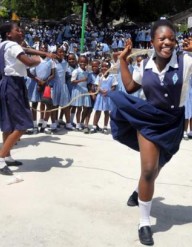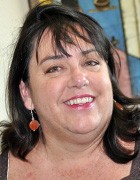Why women? This should not be a question. Of course, women—especially since we make up 50 percent of the world's population! Every day we read or hear about how girls and women are excluded or absent from places like the secondary school classroom or the boardroom, and even from the World Economic Summit at Davos—where only 16 percent of participants had a second X chromosome.
But what we need to see, read, and hear about are those girls and women who are present and accounted for; and who are already making a difference in their countries, their region, and, more importantly, their communities. This is where role-modeling begins.
Over the years, from Honduras to Sri Lanka to Southern Africa, I've heard girls and boys around the globe list politicians, musicians, and sports stars as role models. But what about the role models in their own backyards? Young girls in Brazil now know that a woman can become president. This is exciting. But wouldn't it also have been exciting to follow Dilma Rousseff's pre-presidential path along the way? And what about the other inspiring girls and women who aren't in the national spotlight?
In Egypt, girls and women are out in the street, making their voices heard. Egyptian feminist Nawal el Sadaawi said in a recent interview that women who rarely leave their houses were now protesting in Tahrir Square. Girls and women across all levels need to be seen, heard, and celebrated so that other girls and women can learn from their experiences and perhaps dare to do something they thought was just for boys or men. The multiplier effect can be a powerful tool, especially in development.
There was a saying in my grandmother's day that a lady should have her name in the newspaper only three times in her life: when she is born, when she gets married, and when she dies. Well, those days are long gone. While we have television, radio, and Internet, we also have town hall meetings, peer education groups, and travelling theater troupes. We need to employ each and every communication tool available to tell stories of those girls and women who are making things happen from the bottom up.
Buses and Chickens, Whatever It Takes
My friend Busisiwe Mamba is a primary school principal in Swaziland, where tuition fees were only recently eliminated for just the first two grades. In addition to running the school, she does anything and everything—from raising chickens to taking public transport to Mozambique to deliver a funding proposal—to feed her students or pay their school fees. She is true a role model, though she is largely unsung.
There are countless other women out there undertaking like feats of dedication, compassion, and resilience. So, why haven't we seen or heard their stories? Why aren't we hearing about women who are in the emerging farmers' programs or the girls who are leading after-school clubs?
Just look around you, every day there is a girl or a woman in your backyard making a difference—you probably haven't heard about her.
In this issue we'll introduce you to 11 talented Mozambican women scientists who have been recognized for their work in agriculture; they have all broken barriers on their paths to academic excellence. And they all have a story to tell and serve as an inspiration not only for girls who are interested in science but, for those who girls, boys, and parents who think science is just for boys.
Let's start to get the word out about these women, and all of the women and girls whose good works stretch from the smallest grassroots movements to the most revered halls of parliament. We don't need to wait for a woman to become president to talk about her. Now is the time to support and celebrate those community role models making a difference in their own backyards.
And if we do support and celebrate these women, maybe next time when I visit a school, the list of role models will include the names of a neighborhood health worker, an auntie, or a grandmother.
Mary Ellen Duke has been the gender adviser for the President's Emergency Plan for AIDS Relief and USAID in Maputo, Mozambique, since 2009. She previously worked for the Centre for Development and Population Activities and the Salesians of Don Bosco on girls' education, life skills, and technical training programs in Bolivia, Honduras, Lesotho, Nigeria, South Africa, Sri Lanka, Swaziland, and Zambia. In the 1970s, her seventh-grade teacher told her she didn't really need math because she was a girl. She often wonders how quick he could do currency conversions in his head while conversing in a language other than English.










Comment
Make a general inquiry or suggest an improvement.